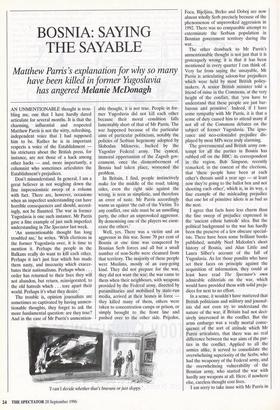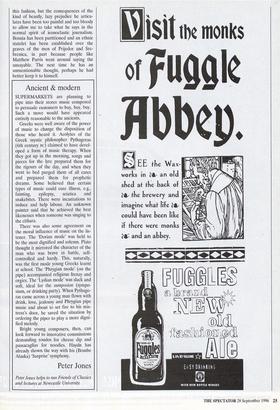BOSNIA: SAYING THE SAYABLE
Matthew Parris's explanation for why so many have been killed in former Yugoslavia has angered Melanie McDonagh
AN UNMENTIONABLE thought is trou- bling me, one that I have hardly dared articulate for several months. It is that the charming, influential and respected Matthew Parris is not the witty, refreshing, independent voice that I had supposed him to be. Rather he is in important respects a voice of the Establishment his strictures about the British press, for instance, are not those of a hack among other hacks — and, more importantly, a columnist who sometimes articulates the Establishment's prejudices.
Don't misunderstand. In general, I am a great believer in not weighing down the fine impressionistic sweep of a column with fact. There are, however, occasions when an imperfect understanding can have horrible consequences and should, accord- ingly, not be flaunted. The war in former Yugoslavia is one such instance. Mr Parris gave a fine example of just such imperfect understanding in The Spectator last week.
'An unmentionable thought has long troubled me,' he writes. With elections in the former Yugoslavia over, it is time to mention it. Perhaps the people in the Balkans really do want to kill each other. Perhaps it isn't just fear which has made them nasty, and insecurity which exacer- bates their nationalisms. Perhaps when ... order has returned to their lives they will not abandon, but return, reinvigorated, to the old hatreds which ... tore apart their world, Perhaps it's what they desire.'
The trouble is, opinion journalists are sometimes so captivated by having unmen- tionable thoughts, they forget to ask the more fundamental question: are they true? And in the case of Mr Parris's unmention-
able thought, it is not true. People in for- mer Yugoslavia did not kill each other because their moral condition falls lamentably short of that of Mr Parris. The war happened because of the particular aims of particular politicians, notably the policies of Serbian hegemony adopted by Slobodan Milosevic, backed by the Yugoslav Federal army. The cynical, immoral opportunism of the Zagreb gov- ernment, once the dismemberment of Bosnia had taken place, worsened the problem.
In Britain, I find, people instinctively make for the middle of the road; taking sides, even the right side against the wrong, is seen as simplistic, and therefore an error of taste. Mr Parris accordingly warns us against 'the cult of the Victim. To any conflict, one side must be an unwilling party, the other an unprovoked aggressor. By demonising one of the players we exon- erate the others.'
Well, yes. There was a victim and an aggressor in this war. Some 70 per cent of Bosnia at one time was conquered by Bosnian Serb forces and all but a small number of non-Serbs were cleansed from that territory. The majority of these people were Muslims, mostly of an easy-going kind. They did not prepare for the war, they did not want the war; the war came to them when their neighbours, with weapons provided by the Federal army, directed by paramilitaries and mobilised by state-run media, arrived at their homes in force they killed many of them, others were taken to concentration camps or prison, or simply brought to the front line and pushed over to the other side. Prijedor, 'I can't decide whether that's bravura or just sloppy.' Foca, Bijeljina, Brcko and Doboj are now almost wholly Serb precisely because of the phenomenon of unprovoked aggression in 1992. There was no comparable attempt to exterminate the Serbian population in Bosnian government territory during the war.
The other drawback to Mr Parris's unmentionable thought is not just that it is grotesquely wrong; it is that it has been mentioned in every quarter I can think of. Very far from saying the unsayable, Mr Parris is articulating saloon-bar prejudices which were held by most British policy- makers. A senior British minister told a friend of mine in the Commons, at the very height of the conflict, that 'you have to understand that these people are just bar- barous and primitive'. Indeed, if I have some sympathy with Mr Parris, it is that a sense of duty caused him to attend many if not all of the Commons debates on the subject of former Yugoslavia. The igno- rance and neo-colonialist prejudice dis- played by most MPs were truly alarming. The governmental and British army con- tempt for all the parties in Bosnia has rubbed off on the BBC: its correspondent in the region, Bob Simpson, recently remarked, in the context of the elections, that 'these people have been at each other's throats until a year ago — at least now they're going to the ballot box and not shooting each other', which is, in its way, a fine example of the misleading prejudice that one lot of primitive idiots is as bad as the next.
I agree that facts have less charm than the fine sweep of prejudice expressed in the 'ancient ethnic hatreds' idea. But the political background to the war has hardly been the preserve of a few obscure special- ists. There have been some brilliant books published, notably Noel Malcolm's short history of Bosnia, and Alan Little and Laura Silber's account of the fall of Yugoslavia. As for those pundits who have set their faces on principle against the acquisition of information, they could at least have read The Spectator's own admirable editorials on the war, which would have provided them with solid preju- dices for next to no effort.
In a sense, it wouldn't have mattered that British politicians and military and journal- ists did not even try to understand the nature of the war, if Britain had not deci- sively intervened in the conflict. But the arms embargo was a really mortal conse- quence of the sort of attitude which Mr Parris articulates, that there was no real difference between the war aims of the par- ties in the conflict. Applied to all the armies alike, it served to consolidate the overwhelming superiority of the Serbs, who had the weaponry of the Federal army, and the overwhelming vulnerability of the Bosnian army, who started the war with hardly any weapons at all. Here, if nowhere else, careless thought cost lives. I am sorry to take issue with Mr Parris in this fashion, but the consequences of the kind of beastly, lazy prejudice he articu- lates have been too painful and too bloody to allow me to take what he says in the normal spirit of iconoclastic journalism. Bosnia has been partitioned and an ethnic statelet has been established over the graves of the men of Prijedor and Sre- brenica, in part because people like Matthew Parris went around saying the unsayable. The next time he has an unmentionable thought, perhaps he had better keep it to himself.



















































































 Previous page
Previous page